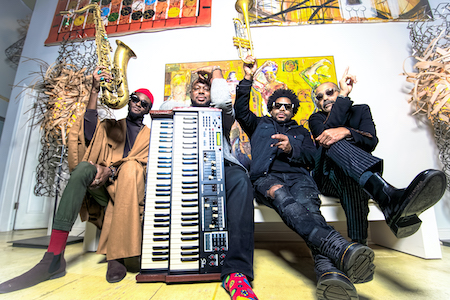Jan 13, 2026 2:09 PM
More Trump-Kennedy Center Cancellations
The fallout from the renaming of the John F. Kennedy Center for the Performing Arts to include President Donald…

A Time For Healing band members, from left, Isiah Collier, Justin Dillard, Corey Wilkes and Kahil El’Zabar.
(Photo: Michael Jackson)The laid-back, metronomic bounce and slap of percussionist Kahil El’Zabar’s earth drum (in tandem with contrapuntal ankle bells) has been heard in Chicago and beyond for more than 50 years.
“The origin of this shape of drum comes from West and Central Africa, then to the West Indies to become conga drums,” El’Zabar says during a roundtable chat with his cross-generational quartet of trumpeter Corey Wilkes, saxophonist Isaiah Collier and keyboardist Justin Dillard, all featured on his latest release, A Time For Healing (SpiritMuse). “In the early ’60s, Chief Bey in NYC taught Black Harold from Chicago how to rope this drum with skin. … Harold taught this style to younger drummers. … We mastered this African-American drumming, different to traditional African, Latin-American or South American.”
The “we” El’Zabar speaks of was called the SunDrummer, and a solo piece on the new recording, “Drum Talk (Run’n In The Streets),” has its genesis in those formative days.
El’Zabar’s irrevocable percussion beats build in intensity through a long-form resolve. Yet, his kit drumming is untame, splashy, exultant, buoyed or goaded by vocal caterwauls. The latter are featured on “Resolution,” where his younger sidemen (El’Zabar is 68, Collier 24, for example) revisit John Coltrane’s call-to-creative-arms from 1964’s A Love Supreme.
Collier, a titanic tenor, had a chance to record at Rudy Van Gelder’s studio recently, on the same equipment that captured Trane’s landmark album, but his first hero was actually Trane’s sidekick, Pharoah Sanders.
“For the longest time I had a lot of stuff backwards and thought that Pharoah was the one who taught Trane,” laughs Collier, who’s mother thought he was being possessed by demons as a kid, listening endlessly to Sanders’ epic rendition of “Impressions” in his bedroom. Some of Sanders’ raspy expressionism, via Collier’s tenor, can be heard on the meditative title track, which is augured by the ancient clockwork of El’Zabar’s kalimba and the gentle piping of Chinese Hulusi flute, which was a gift to Collier from Dillard. “I go through periods with different instruments,” Dillard says. “I buy stuff and if I think it’s cool, after a while I give it away.”
Dillard’s Hammond keyboard — which, live, he plays casually on his lap — variously mimics guitar and acoustic bass sounds. He prods and percolates with an ear for the range and timbre of strings and woodwinds, which he puts down to countless gigs with bassist Junius Paul, guitarist Bobby Broom and flutist Nicole Mitchell, among others. Dillard inhabits several personas on El’Zabar’s tribute to multi-instrumentalist/funk pioneer Eddie Harris, with whom the percussionist first worked at Chicago’s Roadrunner Lounge in 1971. “My biggest lessons from Eddie, apart from understanding the impact of counterpoint and harmonic explorations, was how to count and hold time, maintaining tempos consistently,” El’Zabar says. “And also how big you can make your sound with an economical ensemble.”
Wilkes, a fiery musician, contributes balladry and subtlety to this release and credits long-term work in El’Zabar’s ensembles with strengthening his time. “Especially in the Ethnic Heritage Ensemble, where we have no chordal instrument at all, you have to rely on your intuition, your groove-ability, your ears — everything has to be honed into that thing that isn’t there,” Dillard says. “I learned from Corey, Corey learnt from Kahil. … When I started playing, I was ‘Mr. Notes,’ then Corey would call a tune that only had one or two changes and I would be lost in space.”
“Time IS,” one of the sleeper tracks from the set, shimmies infectiously without ostensible fanfare; the way each member of the quartet places their beat puts ants-in-pants; on the fade, Collier mimics hand-slap-on-drumskin with slap-tongue-on-reed.
At 1 hour and 18 minutes of deeply infused music, the project came together during the thick of the pandemic, and El’Zabar’s dolefully hopeful tune “We’ll Get Through This” says it all. The apparently ageless percussionist and music historian insists on accentuating the positive.
“We’ve come through chaos, health issues, awareness of racial and social injustices,” he says. “There’s an emotional shift toward a compass of integrity … we’re trying to transmit something universal, soulful and uplifting. We need it now, globally.” DB

Belá Fleck during an interview with Fredrika Whitfield on CNN.
Jan 13, 2026 2:09 PM
The fallout from the renaming of the John F. Kennedy Center for the Performing Arts to include President Donald…

Peplowski first came to prominence in legacy swing bands, including the final iteration of the Benny Goodman Orchestra, before beginning a solo career in the late 1980s.
Feb 3, 2026 12:10 AM
Ken Peplowski, a clarinetist and tenor saxophonist who straddled the worlds of traditional and modern jazz, died Feb. 2…

The success of Oregon’s first album, 1971’s Music Of Another Present Era, allowed Towner to establish a solo career.
Jan 19, 2026 5:02 PM
Ralph Towner, a guitarist and composer who blended multiple genres, including jazz — and throughout them all remained…

Rico’s Anti-Microbial Instrument Swab
Jan 19, 2026 2:48 PM
With this year’s NAMM Show right around the corner, we can look forward to plenty of new and innovative instruments…

Dec 11, 2025 11:00 AM
DownBeat presents a complete list of the 4-, 4½- and 5-star albums from 2025 in one convenient package. It’s a great…